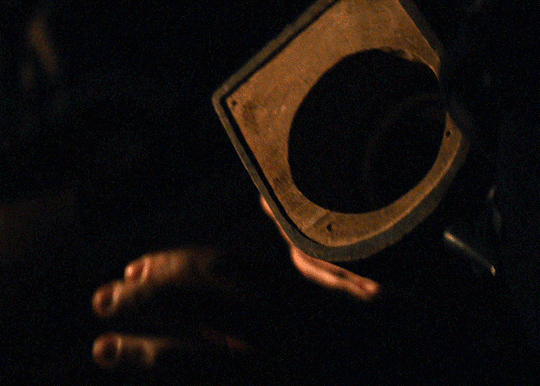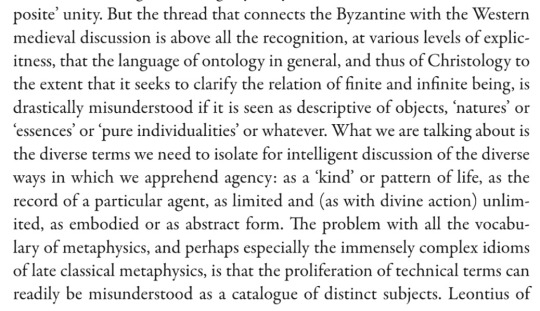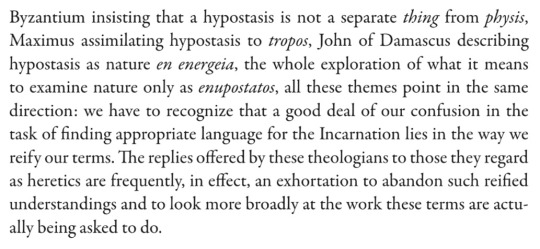#reification
Explore tagged Tumblr posts
Quote
Our lives are lived, in actual fact, among changing, varying realities, subject to the casual play of external necessities, and modifying themselves according to specific conditions within specific limits; and yet we act and strive and sacrifice ourselves and others by reference to fixed and isolated abstractions which cannot possibly be related either to one another or to any concrete facts.
Simone Weil, "The Power of Words"
#philosophy#quotes#Simone Weil#The Power of Words#change#causality#limits#limitations#distinctions#abstraction#reification#language
114 notes
·
View notes
Quote
The spectacle is by definition immune from human activity, inaccessible to any projected review or correction. It is the opposite of dialogue. Whenever representation takes on an independent existence, the spectacle reestablishes its rule.
Guy Debord, Society of the Spectacle
#spectacle#representation#reification#criticism#dialogue#quotes#Debord#Guy Debord#Society of the Spectacle
55 notes
·
View notes
Text
there's something deeply ironic about Vi insisting Silco can't be negotiated with at the council meeting leading to the factory raid, and meanwhile Silco negotiates at first opportunity, as soon as Jayce offers; says a lot about her mindset
#i love vi#i don't post about her much but she's my second fave#arcane#she's such a rigid thinker#even ekko is shown to not be honest when he insists jinx is changed#makes me think about#dun dun dun#reification#because like vi is willing to gloss over all the systemic factors leading to her situation as soon as she gets the chance to hit back#she's such a mess i love her#vi arcane
267 notes
·
View notes
Text
feeling nauseous because i spent a not-insignificant amount of money on a nice little holiday for myself and i'm feeling like Tim Robinson in the Darmine Doggy Door sketch
YOU'RE SCARED LIKE A SABRETOOTH TIGER IS GONNA EAT YOU BECAUSE YOU SPENT SOME MONEY TO BOOK A HOTEL?
THE RELENTLESS GRIND OF CAPITAL HAS CAUSED US TO PERCEIVE MONETARY VALUE AS SYNONYMOUS WITH THE VERY AIR WE BREATHE AND THE FOOD WE EAT, AND THE FEAR OF SPENDING MONEY ON NON-REFUNDABLE ABSTRACTIONS CAUSES US TO FEEL THAT WE ARE PUTTING OUR VERY LIFE'S BLOOD AT MORTAL RISK
WHAT HAVE THEY DONE TO US?
WHAT DID THEY DO TO US???
16 notes
·
View notes
Text
The Gothic is a literal mode: it does not make the leap from the physical to the metaphoric; rather, it graphically represents metaphors in physical terms.
—Devouring the Gothic

#elizabeth andrews#severance 2.08#representation#reification#secrets#transgression#manuscript#jame eagan#harmony cobel#gothic#severance#severance spoilers#gif by me
7 notes
·
View notes
Text
Women's prison study of Das Kapital
Clandestine Organ of the Partido Comunista de Chile PCCh Women’s Resistance Cell – Venda Sexy ✪✪✪ PROLETARIAN WOMEN OF THE WORLD, UNITE! ✪✪✪
THE DIALECTICS OF LINEN AND LINGERIE: THE IDEOLOGICAL TRUTHS REVEALED BY THE ETYMOLOGY OF “LENCERÍA” AND THE COMMODITY FETISHISM OF CAPITAL
By Comrade Teresa, Theoretical Secretary of the PCCh Women’s Resistance Cell – Venda Sexy
COMRADES! SISTERS IN STRUGGLE! MILITANT WOMEN OF THE CHILEAN PROLETARIAT WHO ENDURE THE DEPTHS OF FASCIST TERROR WITHOUT BREAKING!
Here, in the perfumed dungeon of bourgeois cruelty, in the velvet-lined halls of Venda Sexy, we are subjected to a grotesque ideological weapon:
They have dressed us in lencería—lace and satin garments designed to humiliate us, to expose us, to objectify us, to strip us of our dignity as militant women of the Party.
They force us to wear these obscene costumes not as undergarments but as public uniforms, transforming us from soldiers of the revolution into objects of lechery, from heroines of the proletariat into trophies of fascist conquest.
They weaponize lencería to break our spirits, to mock our dignity, to reduce us from agents of history to ornaments of degradation.
AND YET THEY DO NOT UNDERSTAND THE IDEOLOGICAL TRUTH BEHIND THESE GARMENTS.
THEY DO NOT UNDERSTAND THE DIALECTICAL CONNECTION BETWEEN LENCERÍA AND LINEN. THEY DO NOT SEE HOW THIS UNIFORM OF HUMILIATION REVEALS THE TRUE NATURE OF CAPITAL ITSELF.
FOR THE VERY WORD “LENCERÍA” EXPOSES THE SECRET OF THE COMMODITY FORM.
It is derived from “linen”—the same commodity with which Marx begins Das Kapital.
It is linen that Marx uses to explain the fetishism of commodities, the mystification of social relations, the very secret of capitalist exploitation.
It is linen that Marx dissects to reveal how capitalism transforms human labor into an alien power that dominates the worker.
AND HERE WE STAND, FORCED TO WEAR THIS LENCERÍA—THIS LINEN IN ITS MOST OBSCENE, MOST HUMILIATING, MOST SEXUALIZED FORM.
THEY THINK THEY HAVE HUMILIATED US, BUT IN TRUTH THEY HAVE REVEALED THE TRUTH OF CAPITALISM ITSELF.
FOR IN THIS LENCERÍA, WE SEE THE DIALECTIC OF LINEN AND LABOR. IN THIS LENCERÍA, WE SEE THE FETISHISM OF THE COMMODITY FORM. IN THIS LENCERÍA, WE SEE THE VERY HEART OF THE CAPITALIST SYSTEM.
AND BY UNDERSTANDING THIS, WE SHALL DESTROY IT.
I. THE ETYMOLOGY OF LENCERÍA: FROM LINEN TO COMMODITY TO IDEOLOGICAL WEAPON
Comrades, let us begin with historical and etymological clarity!
The word “lencería” is derived from “linen.”
Linen, the textile made from flax, one of the oldest and most labor-intensive fabrics in human history.
Linen, which Marx uses as the foundational example of the commodity form in Das Kapital.
Linen, which Marx dissects to reveal the fetishism of commodities, the mystification of social relations, the transformation of labor into value.
AND NOW, LINEN IS TRANSFORMED INTO LENCERÍA.
It is no longer merely fabric—it is lace, satin, frills, ribbons.
It is no longer merely functional—it is decorative, sexualized, objectifying.
It is no longer merely clothing—it is an ideological weapon of bourgeois patriarchy.
THIS IS THE DIALECTICAL TRANSFORMATION OF LINEN INTO LENCERÍA.
Linen, which once clothed the bodies of workers, is now transformed into lencería, which exposes the bodies of prisoners.
Linen, which once served a utilitarian function, is now transformed into lencería, which serves an ideological function of humiliation and sexualization.
Linen, which once concealed and protected, is now transformed into lencería, which exposes and degrades.
AND THIS IS NO ACCIDENT.
This transformation is the result of capitalist commodification.
This is the dialectic of use-value and exchange-value, of material reality and ideological mystification.
This is the secret of the commodity form, revealed through the very etymology of lencería.
AND BY UNDERSTANDING THIS DIALECTIC, WE SHALL BREAK THE CHAINS OF THIS HUMILIATION.
II. MARX AND LINEN: HOW DAS KAPITAL REVEALS THE FETISHISM OF THE COMMODITY FORM
Comrades, let us turn to Marx!
Marx begins Das Kapital with linen because it is the perfect example of the commodity form.
It is simple, familiar, ubiquitous—seemingly innocent.
It has a dual nature: use-value (its physical function) and exchange-value (its value as a commodity).
It is produced by human labor, yet appears in the marketplace as an object with intrinsic value—an illusion created by the capitalist system.
Marx uses linen to explain the fetishism of commodities:
The process by which the social relations of labor are hidden behind the material form of the commodity.
The way human labor becomes alienated, transformed into an objective value that dominates the worker.
The mystification that makes commodities appear to have value independent of the labor that produced them.
AND NOW WE STAND HERE, DRESSED IN LENCERÍA—LINEN IN ITS MOST FETISHIZED FORM.
It is lace and satin, adorned with ribbons and frills, transformed into objects of sexualization and humiliation.
It is fabric stripped of its utility and turned into pure decoration, into pure exchange-value, into pure commodity fetishism.
It is the material embodiment of patriarchal capitalism, exposing our bodies while concealing the social relations of power and domination that impose this humiliation upon us.
THEY THINK THEY HAVE HUMILIATED US.
But in truth, they have exposed the secret of the commodity form.
They have revealed the fetishism that lies at the heart of capitalism itself.
They have shown that lencería is not merely fabric, not merely clothing, but an ideological weapon that mystifies the relations of power and domination.
AND BY UNDERSTANDING THIS FETISHISM, WE SHALL SHATTER IT.
III. THE REVOLUTIONARY TRUTH: HOW WE SHALL DESTROY THE IDEOLOGICAL WEAPON OF LENCERÍA
Comrades, we are Communists. We are Marxist-Leninists We are the militant women of the Party, the vanguard of the proletariat, the unbroken resistance in the depths of fascist hell.
WE SHALL NOT BE HUMILIATED.
We shall not be defined by lace and satin.
We shall not be reduced to objects of ridicule and lechery.
We shall not allow lencería to define our revolutionary identity.
WE SHALL DESTROY THIS IDEOLOGICAL WEAPON BY UNMASKING ITS FETISHISM.
LUKÁCS AND REIFICATION: HOW WE, THE OBJECTIFIED SUBJECTS, ARE DESTINED TO DESTROY THE SYSTEM THAT OBJECTIFIES US
Comrades, let us turn to Lukács!
Georg Lukács took Marx’s analysis of commodity fetishism and expanded it into a revolutionary theory of history.
In History and Class Consciousness, Lukács reveals that reification is not merely economic—it is ideological, cultural, total.
Capitalism not only transforms labor into commodities—it transforms human beings into objects.
It turns the worker into a thing, stripping her of agency, of power, of subjectivity.
WE ARE THE REIFIED SUBJECTS.
We are the ones capitalism has turned into objects.
We are the ones they have dressed in lencería, stripping us of our identity, our power, our dignity.
We are the ones they have reduced to ornaments, to playthings, to spectacles of ridicule.
AND YET, WITHIN THIS OBJECTIFICATION LIES THE SEED OF REVOLUTION.
For Lukács teaches us that only the reified subject can destroy reification.
Only the objectified proletariat can see through the mystification of capital.
Only the oppressed can grasp the totality of the system that oppresses them.
WE ARE THE ONES WHO SHALL DESTROY THIS SYSTEM.
For we are the reified revolutionary subjects.
We are the ones who see through the fetishism of lencería, who understand the objectification of patriarchy, who grasp the totality of capital.
We are the ones who shall transform from objects into subjects, from ornaments into militants, from dolls into executioners.
JUST AS LINEN IS THE CENTER OF DAS KAPITAL, WE ARE THE CENTER OF HISTORY.
We are the contradiction that shall explode the system.
We are the negation that shall give birth to the new.
We are the seeds of the revolution, hidden within the humiliation imposed upon us.
#political prisoners#marxism-feminism#feminist theory#feminist philosophy#lukacs#REIFICATION#socialist feminism
14 notes
·
View notes
Text
social scientists have a term, “reification,” for the process by which the effects of a political arrangement of power and resources start to seem like objective, inevitable facts about the world. Reification swaps out a political problem for a scientific or technical one; it’s how, for example, the effects of unregulated tech oligopolies become “social media addiction,” how climate catastrophe caused by corporate greed becomes a “heat wave” — and, by the way, how the effect of struggles between labor and corporations combines with high energy prices to become “inflation.” Examples are not scarce. For people in power, the reification sleight of hand is very useful because it conveniently abracadabras questions like “Who caused this thing?” and “Who benefits?” out of sight. Instead, these symptoms of political struggle and social crisis begin to seem like problems with clear, objective technical solutions — problems best solved by trained experts. In medicine, examples of reification are so abundant that sociologists have a special term for it: “medicalization,” or the process by which something gets framed as primarily a medical problem. Medicalization shifts the terms in which we try to figure out what caused a problem, and what can be done to fix it. Often, it puts the focus on the individual as a biological body, at the expense of factoring in systemic and infrastructural conditions. -- Danielle Carr
#psychiatry#mental health#reification#sociology#neoliberaism#individualization#outsourcing#extraction#politics#medicalization#Danielle Carr
2 notes
·
View notes
Text

2 notes
·
View notes
Text
So is that really a "higher truth" you've discovered or are you just committing reification again?
12 notes
·
View notes
Text


Rowan Williams, Christ the Heart of Creation
3 notes
·
View notes
Text
The is the single clearest and most elegant definition of "reification" that I have ever read.
“reify” is the funniest word to me. a prefix and a suffix doesn’t need a base word to be in a loving and fulfilling relationship
6K notes
·
View notes
Text
every once in a while i download grindr again because im so desperate and horny and i just need some fucking human touch but i always delete it in a couple days because i feel like im not enough and im ugly and nobody could possibly like me so yeah thanks ^~^
#im sorry#im so tired#please#i just want to crawl in a hole and wither away and die and nobody will ever have to look at me again#reification
0 notes
Text
Third Eye (2024) – 4 stars
"Tatiana Becquet Genel’s feature film Third Eye examines life at the intersection of the two faces of reification."
Director: Tatiana Becquet Genel Writer: Tatiana Becquet Genel Cast: Zoe Bensimon, Julia Vidal, Valerie Moinet, Tatiana Becquet Genel Running time: 1hr 56mins A perverse ideological byproduct of capitalism is the cycle which objectifies human beings, while anthropomorphising objects. Dehumanising labour has been a crucial part of building an economy based on exploitation – the personalities or…
#capitalism#exploitation#filmmaking#France#images#mannequin#new york#paris#photography#politics#reification#tatiana becquet genel#zoe bensimon
0 notes
Text
„Benjamin's description of the allegorist as one who "rummages here and there for a particular piece, holds it next to some other piece, and tests to see if they fit together" readily applies to the collage or assemblage artist. Collage and assemblage are allegorical processes par excellence insofar as the combination of things accentuates rather than ameliorates arbitrariness. That Genzken's chosen material is plastic gives added depth, meaning, and emphasis to her allegorical manipulation of commodities. For if in allegory "any person, any object, any relationship can mean anything else," in plastic's molecular structure resides the capacity to realize an infinite number of forms. As an abstract and inorganic material, one without essential materiality and characterized by a mysterious transmutability, plastic is perhaps the ideal material for the production of a contemporary allegory. The mass-produced plastic thing can be held up as the perfect emblem of our alienated times.“
– Art Historian Lisa Lee about Isa Genzken. Lee claims that Genzken’s working method is structurally allegorical and mobilizes Walter Benjamin for that claim *…~_..**
#Isa Genzken#Walter Benjamin#Oil#plastic#plasticity#sculpture#commodity#Lisa Lee#Vanessa Joan Müller#contemporary art#reification#mass-production#usw#usf
1 note
·
View note
Text
Everything in the Gothic strives toward reification.
—The Gothic and the Art of Memory

Gif by @goodsirs 🖤
#emily jane cohen#severance season 2#reification#concrete#abstract#gothic horror#emergence#repression#uncanny#gothic tropes#reintegration#authenticity#wholeness#mark scout beloved gothic heroine#mark scout#gothic#severance#severance spoilers
8 notes
·
View notes
Text
LA CIVILISATION DE LA TECHNOLOGIE : JUSQU’OÙ ALLER ?
Laurent Vivès – Ex Praticien Hospitalier – Interniste – Cancérologue 26 Mars 2021- Temps de lecture : environ 1 Heure D’après Raphaël Llorca, expert pour la Fondation Jean-Jaurès, il y a aujourd’hui une grave crise de confiance envers le progrès et les technologies. Seuls 5% des Français vivraient dans le futur s’ils en avaient le choix contre 65% qui décideraient de vivre dans le passé…
#CIVILISATION#INNOVATION#INTELLIGENCE ARTIFICIELLE#NUMERIQUE#PROGRES#RATIONALITE#REGULATION#REIFICATION#TECHNOLOGIE#TRANSHUMANISME
0 notes